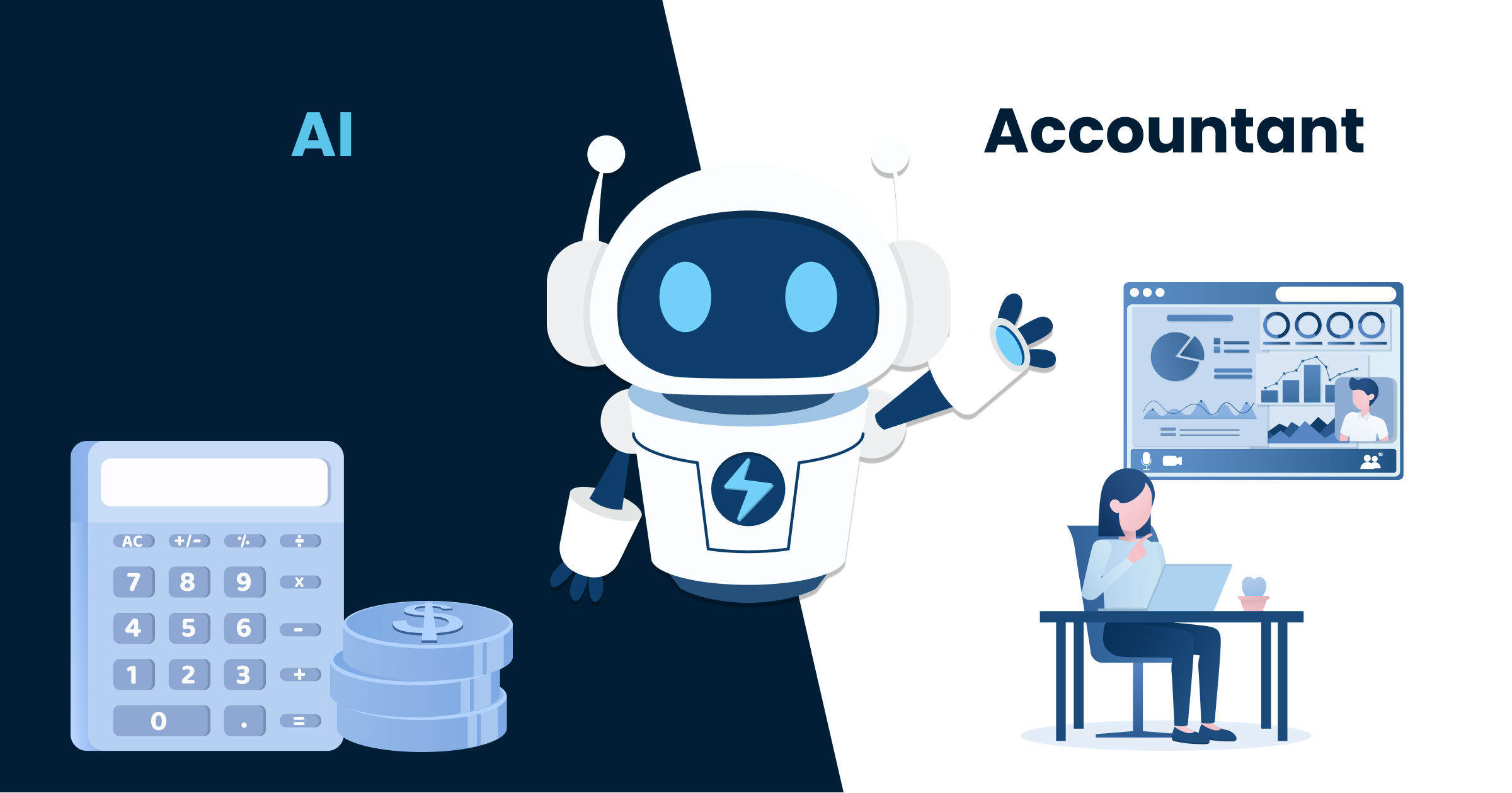Worried about robots taking your spreadsheets? You're not alone! The chatter around Artificial Intelligence (AI) and its impact on jobs is everywhere. For accountants, this isn't just background noise; it's a real question about the future of a long-standing profession. So, let's grab a coffee (or a calculator) and explore what AI truly means for the world of numbers.
This post cuts through the hype to give you a clear picture. We'll examine which accounting tasks AI is set to automate, and more importantly, which areas will continue to rely on human expertise and judgment. From basic data entry to complex strategic advice, we'll break down the shifts happening in the accounting landscape. Get ready to understand the real story.
By the end, you'll have a solid grasp of how accountants can not only survive but also thrive alongside AI. We'll cover ways to adapt, grow new skills, and leverage AI as a tool to become even more impactful. Consider this your friendly guide to navigating the exciting-yet-unpredictable intersection of accounting and artificial intelligence.
Explore this post with:
Table of contents
AI in Accounting: Transform or Replace?
The debate on whether AI will replace accountants is heating up, and opinions are as diverse as they come. Some accounting professionals express 'automation anxiety', fearing AI might make their roles obsolete. According to a CPAJournal article, while AI is indeed transforming the industry, it is not expected to fully replace accountants. They stress that AI lacks the human judgment needed for complex decision-making.

Credits: Datarails.com
On the flip side, AI is seen as a partner in progress by many. A Karbon report shows 71% of accountants believe AI will significantly transform their roles, offering opportunities to focus on more strategic tasks. However, only 25% are actively pursuing AI training, highlighting a gap between interest and action. This shift creates room for accountants to leverage AI in enhancing productivity and efficiency, rather than viewing it as a threat.
It’s clear AI is poised to change accounting, but not necessarily by cutting jobs. Chris Freeland, CEO of CPA Australia, argues that AI and automation create new opportunities and elevate accountants as strategic advisors, refuting predictions of a decline in accounting jobs by the World Economic Forum (Accounting Times). As AI takes over repetitive tasks, the human touch and nuanced understanding remain irreplaceable, ensuring accountants not only survive but thrive in this evolving landscape.
What parts of Accountant jobs is AI replacing?
AI is making significant strides in automating various tasks traditionally performed by accountants. For instance, functions like data entry and financial reporting are increasingly being handled by AI systems, which can process large amounts of data with greater speed and accuracy than humans. According to a Thomson Reuters report, the automation of tax return preparation and bookkeeping tasks is allowing accountants to redirect their focus towards more strategic roles.

Credits: Thomson Reuters
Moreover, AI tools enhance data analysis capabilities, providing accountants with predictive analytics that can aid in decision-making. A study published in the European Journal of Accounting, Auditing and Finance Research emphasizes how AI improves financial forecasting while also raising concerns about potential job displacement (EJAAFR). As AI continues to evolve, accountants are encouraged to adapt by developing new skill sets, particularly in areas that require human insight and relationship management.
What parts of Accountant AI cannot replace
Despite the technological strides of AI, certain elements of accounting remain uniquely human. For example, critical thinking and judgment are areas where accountants excel. According to a Big Four report, human accountants are crucial for interpreting complex financial data where nuanced understanding is necessary. AI can churn out numbers, but it lacks the ability to make informed decisions that only human insight can offer.

Credits: NYSSCPA
In addition, client relationships form a cornerstone of accounting practices. Building trust and understanding client needs can't be automated. As discussed in Minnesota Society of CPAs, accountants are not just number crunchers; they're trusted advisers who navigate the intricate web of client interactions and ethical considerations. This interpersonal aspect is something AI is simply not equipped to handle.
Lastly, the role of an accountant as a strategic advisor remains irreplaceable by AI. Accountants guide businesses through financial decisions, bringing a depth of understanding of market trends and strategic planning that algorithms can't replicate. According to EY's Paul Goodhew, while AI tools can aid in data processing, the adaptability of human accountants in a shifting business landscape is unmatched.
How Accountants Can Adapt in the AI Era
The role of accountants is evolving as AI technologies automate routine tasks like data entry and basic analysis. This shift allows accountants to transition from traditional bookkeeping roles to strategic advisory positions, where they can leverage AI tools to provide deeper insights and enhance decision-making processes. According to research from ACCA, understanding AI will be essential for staying relevant in the field.
Credits: Elsevier
To successfully adapt, accountants should focus on developing skills in data analytics, AI, and technology integration. Engaging in continuous learning through certifications and courses will keep them updated on industry trends. Also, cultivating soft skills like communication and problem-solving will help in explaining complex data findings to clients and collaborating effectively within teams, as highlighted in a LinkedIn article.
Accountant hiring trends in the US
The accountant job market in the U.S. is currently experiencing a high demand for skilled professionals, driven by a short supply of qualified candidates and evolving workplace expectations. According to Robert Half's analysis, the unemployment rate for accounting roles is significantly lower than the national average, creating a competitive environment for job seekers.

Credits: LinkedIn
Recent trends highlight a growing emphasis on technology skills in the field. As reported by LinkedIn, proficiency in financial technology, data analytics, and AI-driven financial modeling is increasingly valued, providing a competitive edge for job seekers. Additionally, many companies are offering hybrid or remote work arrangements to attract talent.
Job statistics from Indeed reveal a steady increase in accounting job postings, indicating positive hiring momentum. The U.S. Bureau of Labor Statistics projects a 6% job growth for accountants and auditors through 2033, translating to approximately 130,000 annual job openings, as detailed by Empower.
Is Accountant AI safe?
In the world of accounting, AI is more of a friendly assistant than a job thief. While AI can streamline tasks like data entry and document summarization, it lacks the nuanced judgment and human connection needed in the profession. According to Thomson Reuters, many accountants believe that while AI can enhance productivity and accuracy, it won't fully replace them. Instead, it will transform their roles, allowing them to focus on higher-value tasks like strategic planning and advisory services.
The general consensus from industry experts is that AI will automate routine responsibilities but won't eliminate the need for accountants. As highlighted in a report by Sage, while AI tools enhance efficiency, accountants who embrace this technology will thrive. Roles requiring empathy and complex decision-making—areas where humans excel—will continue to be in high demand, keeping accountants very much safe from total replacement.
Hiring Accountants? Here's What Smart Recruiters Look For
The accounting world isn't just about old-school ledgers anymore-it's getting a digital upgrade! Today's top accountants aren't just good with numbers; they're savvy with AI tools, turning data into smart business moves, and even know how to 'chat' effectively with AI systems. Look for candidates who grasp data analytics and embrace new tech, as these skills are now key for any modern finance role.
Credits: ICAEW
Don't forget the human touch! Communication, problem-solving, and a healthy dose of skepticism are just as important when dealing with AI-generated reports. To really see what candidates can do, forget just scanning resumes. Adaface skill tests, like the Accounting Assessment Test, let you check their actual accounting knowledge and their ability to apply it.
To screen for their AI prowess, use our Generative AI Test and Prompt Engineering Test. These help you find individuals who can leverage AI for better insights and workflow. Adaface tests give you a clear, objective view of on-the-job skills, letting you hire with confidence.
Prompt Engineering Test
Generative AI Test
Accounting Assessment Test
Unlocking a Future of Growth: AI for Accountants
For accountants, the future is brighter than you might imagine. AI is taking over tedious tasks like data entry, transaction categorization, and document summarization, freeing up precious time (Source 1, Source 4). This shift means professionals can pivot to more engaging work, focusing on advanced analytics and strategic advisory for clients (Source 3, Source 6). Employers will see a significant boost in productivity and accuracy across their teams (Source 2, Source 7).

Credits: Karbon
Here's the exciting part: AI cannot replicate human critical thinking, empathy, or the nuanced art of building client relationships (Source 5). Accountants will evolve into highly valued strategic partners, using AI-generated data to provide deeper insights and proactive recommendations (Source 3, Source 6). This transformation demands upskilling in AI tools, making careers more stimulating and impactful (Source 2, Source 9).
Looking ahead, AI isn't a threat; it's a powerful ally, designed to amplify human capabilities (Source 5). This collaboration promises a dynamic future where accountants and firms grow, innovate, and deliver unparalleled value. Embrace this wave of change for an exciting new era in accounting.

40 min skill tests.
No trick questions.
Accurate shortlisting.
We make it easy for you to find the best candidates in your pipeline with a 40 min skills test.
Try for freeRelated posts



